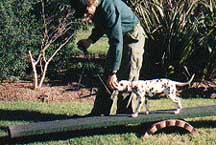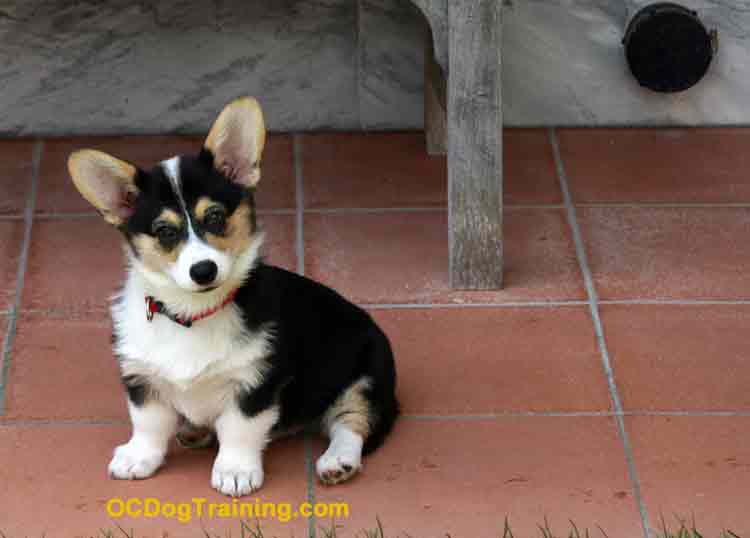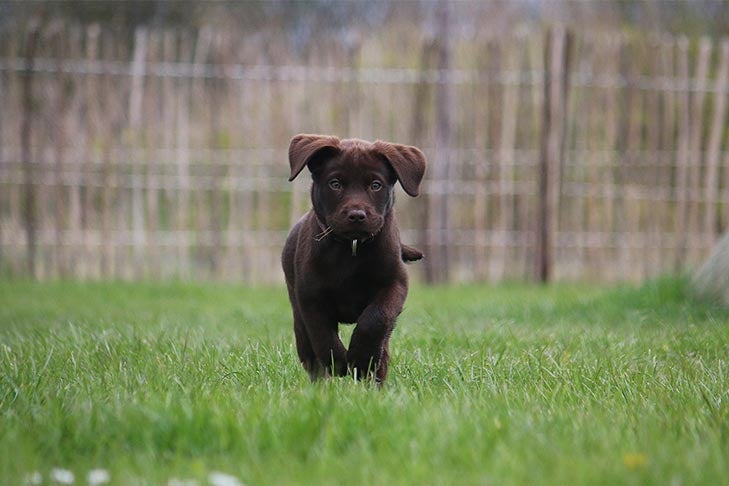What can a seven (7) week old puppy learn is a question I received from one of my dog training websites.

See the puppy training video about half way down the page. I got this question from a reader who wanted to know “What to train a dog at 7 weeks.” I am guessing they want to know what a puppy can learn when it is only seven weeks old. This is a great question because it’s during the formative early weeks that training has the biggest effect on future behavior. Most of the important social skills for living with humans are acquired during the early weeks.
The skills we can start teaching our puppies at seven weeks include socialization and potty training (house breaking.) It’s particularly important that potty training is done correctly at an early age to prevent housebreaking problems later in life.
Other life skills a young puppy can learn are not to jump on people, proper play behavior, not to bite hard, and to come when called. I also like to begin very gentle leash conditioning sometime also called leash breaking. I generally don’t like using the word breaking for dog training, but it does have a long tradition in animal training.

In Home Puppy Training With a Corgi Pup
Hi Linda, thanks for stopping by. Those are puppies I am fostering for a bit. After losing our other dog, we wanted to keep a bit busy and help out pups in need. They are doing very well in learning polite skills!
By this age, pups have the instinct to pick areas to go potty that are away from the locations where they sleep, eat, drink, or play. These instincts may be thwarted in puppy mill dogs, who are forced to potty in small cages.
Research by Pettijohn et al. showed that toys had no effect on relieving a puppys separation distress, but that social stimuli did, and in particular, the presence of humans appeared to be preferred to dogs for relief at seven to eight weeks of age.
At seven weeks, puppies are at a high growth stage and are using everything you feed them to grow.
Puppies who are adopted out at seven weeks and are crated may benefit from the use of a “Snuggle Puppy” at night. A Snuggle Puppy is a dog behavior aid that consists of a stuffed animal that comes with an area to insert a heat pack and some models also have “heartbeat” options that help pups adjust without their littermates and moms.
Jump Ahead:
To start off on the right foot (and paw!) with your pup, they’ll need to know what you expect. This will make them feel secure in their ability to meet the goals laid out going forward.
The foundation of training should be based on positive reinforcement. Positive reinforcement is the process of giving a dog (or person!) a reward to encourage the behavior you want, like getting a paycheck for going to work. The idea is not to bribe with the behavior but to train it using something your dog values.
Avoid using punishment such as leash corrections or yelling. Punishment can cause a dog to become confused and unsure about what is being asked of them. It is important to remember that we can’t expect dogs to know what they don’t yet know–just like you wouldn’t expect a 2-year-old child to know how to tie their shoes. Patience will go a long way in helping your new puppy learn how to behave.
Reinforcement can be anything your dog likes. Most people use small pieces of a “high-value” food for training treats— something special, such as freeze-dried liver or even just their kibble. Lavish praise or the chance to play with a favorite toy can also be used as a reward. Dogs must be taught to like praise. If you give the dog a treat while saying “Good dog!” in a happy voice, they will learn that praise is a good thing and can be a reward. Some dogs also enjoy petting. Food is often the most convenient way to reinforce behavior.
Puppies can begin very simple training starting as soon as they come home, usually around 8 weeks old. Always keep training sessions brief—just five to 10 minutes—and always end on a positive note. If your puppy is having trouble learning a new behavior, end the session by reviewing something they already know and give them plenty of praise and a big reward for their success. If your puppy gets bored or frustrated, it will ultimately be counterproductive to learning.

Puppy Training – 7 Week Old German Shorthair Pointer
But often it doesnt work out as well as wed hoped. Puppies are delightful bundles of energy and curiosity…. but they can also be exasperating and frustrating.
If you respond properly to everything the puppy does, the adjustment period will be much shorter and less stressful for both of you.
If you do not respond properly…. well, unfortunately thats why so many teenage dogs are turned over to rescue groups and animal shelters. Many well-meaning owners simply dont understand how to train a puppy, or when to start training a puppy.
So lets look at my puppy training schedule by age. I use this puppy training schedule with my own pups and with all of the pups in my training classes.
Dogs thrive on sameness, routines that are familiar, predictable, repeated. As much as possible, do the same things with your puppy every day – the same things in the same order, using the same words.